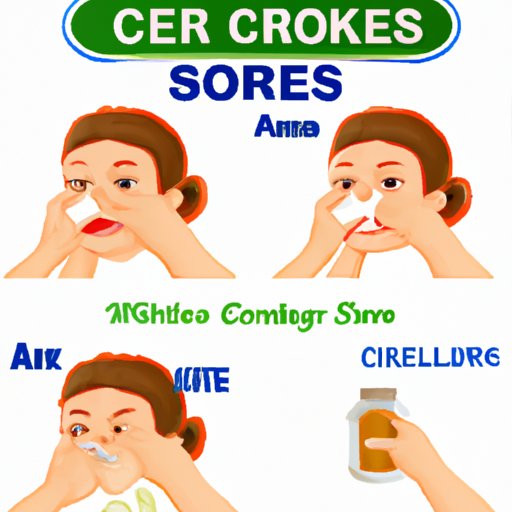I. Introduction
Canker sores are small but incredibly painful open sores that form inside the mouth. They can make eating, brushing your teeth, and even speaking uncomfortable, leading to a great deal of inconvenience in daily life. While canker sores are not contagious, they can still be a frustrating and painful problem to solve. Whether you’re dealing with a solitary canker sore or a recurrent outbreak, this guide will provide you with tips and remedies to help ease the pain and speed up the healing process.
II. Identifying and preventing canker sores
Canker sores are small, shallow ulcers that form on the soft tissues of the mouth. They are typically round with a red border and a white, gray, or yellow center. Canker sores can be caused by a variety of factors, including stress, lack of sleep, and certain foods. Some people are also more prone to getting them due to genetics.
Fortunately, there are several steps you can take to prevent canker sores from forming. Some things you can do include avoiding trigger foods like acidic fruits and vegetables, managing your stress levels, and brushing your teeth gently with a soft-bristled toothbrush.

III. Home remedies for canker sores
Several home remedies can significantly reduce the pain and discomfort of canker sores, including rinsing your mouth with warm saltwater or baking soda solution, applying aloe vera gel, and using a cotton swab soaked in hydrogen peroxide.
While these remedies are generally safe, it’s essential to follow instructions carefully to avoid potential risks or side effects. For example, it’s best to dilute the hydrogen peroxide with water before applying it to the sore to prevent further irritation.
IV. Over-the-counter treatments for canker sores
There are also several over-the-counter antiseptic and numbing gels available at pharmacies that can help relieve the pain and speed up the healing process of canker sores. These treatments typically contain ingredients like benzocaine or hydrogen peroxide and can be applied directly to the sore.
It’s essential to choose the right treatment for your needs, as some may be better suited to certain people depending on their health history, age, or other factors. You should also take care to follow the instructions closely to prevent any side effects or complications.
V. Diet and nutritional supplements for canker sores
Certain types of foods and supplements can help speed up the healing process of canker sores. These include foods that contain vitamins B12 and folate, such as eggs, milk, and leafy greens, and supplements like zinc and vitamin C.
Research has shown that consuming these foods or supplements can help reduce the onset and frequency of canker sores, making them a valuable addition to anyone’s diet plan. However, if you have any dietary restrictions or medical conditions, it’s essential to consult with your healthcare provider before taking any supplements.
VI. Natural remedies for canker sores
Several natural remedies can also be useful in treating canker sores, such as herbal teas, essential oils, and coconut oil. Chamomile tea, for example, can help reduce inflammation and soothe pain, while tea tree oil acts as an antiseptic, helping to prevent infection.
It’s essential to use natural remedies correctly, as some may cause adverse reactions depending on the person. For example, some people may be allergic to specific essential oils, so it’s best to patch test before using them.
VII. Stress management for canker sores
Stress is a significant contributor to the onset and severity of canker sores, making stress management techniques a vital part of managing them. Some gentle stretching techniques like yoga, meditation, or tai chi can help reduce stress levels, leading to fewer canker sore occurrences.
It’s important to note that stress affects each individual differently, so what works for one person may not be as effective for another. Experimenting with different techniques and finding what works best for you can be key to a successful stress management plan.
VIII. Seeking medical assistance for canker sores
If your canker sores persist for more than two weeks, or you experience severe symptoms like fever or difficulty swallowing, it’s essential to seek medical assistance. A healthcare provider can prescribe prescription-strength medications or recommend additional treatment options.
During a medical appointment, you can expect your healthcare provider to examine your mouth and perform tests or analyses to determine the root cause of your canker sores. They may also recommend lifestyle changes, such as improving your oral hygiene or incorporating more stress management techniques, to prevent future occurrences.
IX. Conclusion
Canker sores can be a painful and frustrating issue to deal with, but there are several steps you can take to treat them and prevent future occurrences. From home remedies to natural remedies and lifestyle changes, this guide has provided you with several tips and strategies to help ease the pain and speed up the healing process. Remember, stress management plays a significant role in canker sore prevention, so finding ways to de-stress and relax can help keep them at bay. With the right tools and knowledge, you can successfully manage your canker sores and take steps towards living a healthier, pain-free life.
